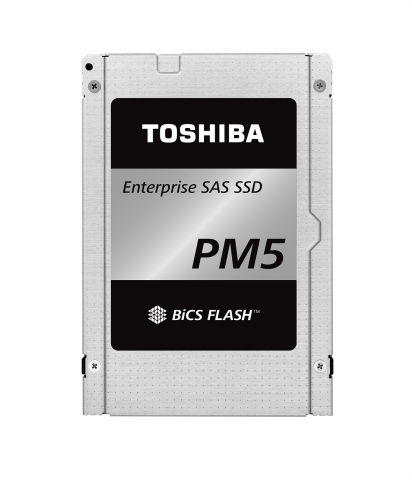Toshiba Memory Achieves VMware vSAN Certification for PM5 Series of Enterprise SAS SSDs
Toshiba Memory America, Inc. (TMA), the U.S.-based subsidiary of Toshiba Memory Corporation, today announced that its newly released PM5 Series of 12Gb/s (gigabits per second) enterprise SAS SSDs has earned VMware vSAN™ 6.7 certification. This certification enables TMA’s flash-based PM5 storage devices to be shared across connected hosts in a VMware vSphere® cluster. With the vSAN 6.7 certification, users can pool PM5 Series SSDs together in a single, distributed shared data store. This allows users to define the storage capabilities required (such as performance, capacity and availability) for each connected virtual machine (VM) within the VMware vSAN cluster. These capabilities not only further hyper-converged infrastructure (HCI) options in virtual environments, but also ensure that storage policies are administered and maintained within the PM5 Series with the utmost vSAN compatibility.
This press release features multimedia. View the full release here: https://www.businesswire.com/news/home/20190226005218/en/

Toshiba Memory's flash-based 12Gb/s PM5 storage devices are now approved for vSAN 6.7 customers. (Photo: Business Wire)
The certification of the PM5 Series enables VMware vSAN support for both hybrid and all-flash configurations using a two-tier storage architecture (capacity tier and cache tier). All write operations are sent to the cache tier and are subsequently de-staged to the capacity tier over time. When a PM5 Series SSD is deployed within a hybrid configuration, its cache tier is used as both a read and write cache, keeping hot data to improve performance. In an all-flash configuration, 100 percent of the cache tier is used for the write buffer. Given the benefits of tiered storage, PM5 Series SSDs are capable of meeting the demanding requirements of both enterprise and data center customers.
Built with Toshiba Memory Corporation’s 64-layer BiCS FLASH™ TLC (3-bit-per-cell) 3D flash memory, the PM5 Series offers up to 15.36 terabyte1 (TB) capacities in a 2.5-inch form factor2, and supports a full range of endurance and capacity ranges. It also utilizes the industry’s first3 MultiLink SAS™ architecture, which delivers the fastest4 SAS SSD sequential performance to date5. In addition, PM5 Series SSDs support multi-stream write technology – a feature that intelligently manages and groups data types together to minimize write amplification and garbage collection. This translates into reduced latency, improved endurance, increased performance, and better Quality of Service (QoS).
“We are pleased to collaborate closely with Toshiba Memory America to jointly certify flash innovations for the fast-growing hyper-converged infrastructure market,” said Lee Caswell, vice president products, Storage and Availability Business Unit, VMware. “Now that database applications represent the top workload for VMware vSAN, flash performance is critical. Customers looking for proven compatibility and interoperability can turn to Toshiba Memory’s PM5 12Gb/s SAS SSDs.”
“Toshiba Memory enterprise SSDs are built to withstand the most demanding performance and reliability needs of mission-critical applications,” said Alvaro Toledo, vice president of SSD marketing and product planning, Toshiba Memory America, Inc. “Working directly with VMware to achieve certification for our PM5 SAS SSDs is key to providing peace of mind to customers utilizing a vSAN solution.”
The PM5 Series of 12Gb/s SAS SSDs with VMware vSAN 6.7 and VMware ESXi™ 6.7 certification is now shipping. Available options include customized server OEM models also approved for vSAN all-flash capacity tier and caching tier, as well as hybrid caching tier implementations.
About Toshiba Memory America, Inc.
Toshiba Memory America, Inc. is the U.S.-based subsidiary of Toshiba Memory Corporation, a leading worldwide supplier of flash memory and solid state drives (SSDs). From the invention of flash memory to today’s breakthrough 96-layer BiCS FLASH™ TLC (3-bit-per-cell) 3D flash memory technology, Toshiba continues to lead innovation and move the industry forward. For more information on Toshiba Memory, please visit business.toshiba-memory.com and follow us on social media.
© 2019 Toshiba Memory America, Inc. All rights reserved. Information in this press release, including product pricing and specifications, content of services, and contact information is current and believed to be accurate on the date of the announcement, but is subject to change without prior notice. Technical and application information contained here is subject to the most recent applicable Toshiba product specifications.
MultiLink SAS is a trademark of the SCSI Trade Association. VMware ESXi, VMware vSAN and VMware vSphere are trademarks or registered trademarks of VMware Inc. in the United States and/or various jurisdictions. All other trademarks or registered trademarks are the property of their respective owners.
1 Definition of capacity: Toshiba Memory Corporation defines a gigabyte (GB) as 1,000,000,000 bytes and a terabyte (TB) as 1,000,000,000,000 bytes. A computer operating system, however, reports storage capacity using powers of 2 for the definition of 1GB = 230 bytes = 1,073,741,824 bytes, 1TB = 240 bytes = 1,099,511,627,776 bytes and therefore shows less storage capacity. Available storage capacity (including examples of various media files) will vary based on file size, formatting, settings, software and operating system, such as Microsoft Operating System and/or pre-installed software applications, or media content. Actual formatted capacity may vary.
2 "2.5-inch" indicates the form factor of the SSD. It does not indicate drive's physical size.
3 As of August 7, 2017, this claim is based on industry-published specifications and a Toshiba Memory Corporation survey.
4 As of today’s announcement, this claim is based on industry-published specifications.
5 Read and write speed may vary depending on the host device, read and write conditions, and file size.
View source version on businesswire.com: https://www.businesswire.com/news/home/20190226005218/en/




